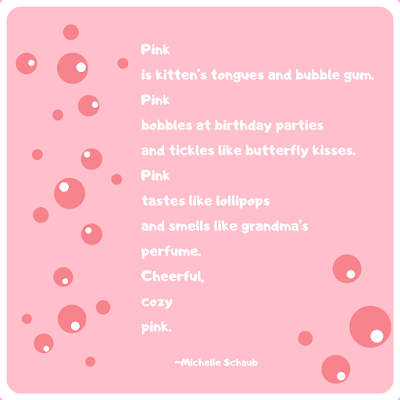How would you feel in a world without color?
When I
pose this question to students, I'm met with shivers, frowns, and responses
like "Sad." "Bored." "Terrible."
Luckily
our world is filled with color. Color adds depth, vibrance, and variety to
life. Different colors spark different thoughts, feelings, images, and
memories.
Poets Know the Power of Color.
Reading
and writing color poems with students is a great way to reinforce the concept
of imagery. It also supports important literacy skills like distinguishing
between literal and nonliteral language and identifying
phrases that suggest feelings or appeal to the senses. A great
mentor text to show students how poets engage the senses through color is Red
Sings from Treetops: A Year in Colors by Joyce Sidman. In this
Caldecott Honor poetry collection illustrated by Pamela Zagarenski, Joyce Sidman explores the seasons as they come
to life through colors. In spring red “squirms
in the road/ after rain.” In autumn, purple smells of “old leaves, crushed
berries/ squishy plums.” In winter green “waits / in the hearts of trees.” In each poem, Sidman personifies different colors,
combining them with sights, sounds, smells, and tastes to paint a vibrant
picture of the seasons.
A great
mentor text to show students how poets engage the senses through color is Red
Sings from Treetops: A Year in Colors by Joyce Sidman. In this
Caldecott Honor poetry collection illustrated by Pamela Zagarenski, Joyce Sidman explores the seasons as they come
to life through colors. In spring red “squirms
in the road/ after rain.” In autumn, purple smells of “old leaves, crushed
berries/ squishy plums.” In winter green “waits / in the hearts of trees.” In each poem, Sidman personifies different colors,
combining them with sights, sounds, smells, and tastes to paint a vibrant
picture of the seasons.
What Flavor is that Color?
Before
reading Red Sings from Treetops, I prime my students to think about color
in terms of its association with other senses, emotions, and images. I direct students to close their eyes, and I
jingle my keys. Then I ask, “What color is this sound?” I follow this
with questions like…
What color is anger? Pride?
Colorful Lessons
After
brainstorming creative connotations for colors, I use Red Sings from
Treetops to launch students into reading and writing color poems. First, we read the book, looking for ways
Sidman describes colors using different senses. Then students write their own
color poems using a COLOR POEM PLANNER and COLOR POEM TEMPLATE to help spark
their ideas. (For the step-by-step
lesson click here.)
 A great
mentor text to show students how poets engage the senses through color is Red
Sings from Treetops: A Year in Colors by Joyce Sidman. In this
Caldecott Honor poetry collection illustrated by Pamela Zagarenski, Joyce Sidman explores the seasons as they come
to life through colors. In spring red “squirms
in the road/ after rain.” In autumn, purple smells of “old leaves, crushed
berries/ squishy plums.” In winter green “waits / in the hearts of trees.” In each poem, Sidman personifies different colors,
combining them with sights, sounds, smells, and tastes to paint a vibrant
picture of the seasons.
A great
mentor text to show students how poets engage the senses through color is Red
Sings from Treetops: A Year in Colors by Joyce Sidman. In this
Caldecott Honor poetry collection illustrated by Pamela Zagarenski, Joyce Sidman explores the seasons as they come
to life through colors. In spring red “squirms
in the road/ after rain.” In autumn, purple smells of “old leaves, crushed
berries/ squishy plums.” In winter green “waits / in the hearts of trees.” In each poem, Sidman personifies different colors,
combining them with sights, sounds, smells, and tastes to paint a vibrant
picture of the seasons. |
 |
Here is a
color poem I wrote to provide an example for students:
And here
are some color poems my third-grade students created:
Introduce
your students to the power of color through color poems. You’ll find a rainbow of hues singing from the
treetops (or classroom walls as the case may be!)
About Michelle Schaub
Michelle Schaub is a language arts teacher and award-winning children's poet. She is the author of the picture book poetry collections Fresh-Picked Poetry: A Day at the Farmers’ Market, (which won the 2018 Growing Good Kids Award and 2019 Northern Lights Book Award,) and Finding Treasure: A Collection of Collections. She also wrote two picture books in verse, Dream Big, Little Scientists and Kindness is a Kite String. Her poems appear in several anthologies, including The Poetry Anthology for Celebrations and Great Morning! Poems for School Leaders to Read Aloud. Michelle visits schools and speaks at conferences on the power of poetry to boost literacy.





Comments
Post a Comment